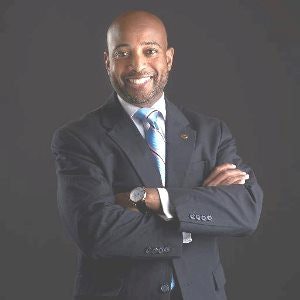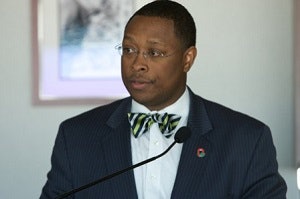This year’s International Colloquium on Black Males in Education (ICBME) is tackling the intersection of racial uprisings and COVID-19, a challenge the U.S., and by extension the world, is grappling with.
Titled, “A Virtual Experience: When Racial Uprising and COVID-19 Collide,” this year’s ICBME is scheduled to take place each Tuesday of this month and brings together prominent scholars to tackle some of the issues that impact Black boys and young men.
 Dr. Jerlando F.L. Jackson
Dr. Jerlando F.L. Jackson“The International Colloquium on Black Males in Education is an important gathering,” said Dr. Juan Gilbert, the Andrew Banks Family Preeminence Endowed Professor & chair of the Department of Computer & Information Science & Engineering at the University of Florida. “Black males across the globe are experiencing challenges from racism, bias, etc. The ICBME provides a venue where research and best practices are communicated with the community. It allows for solutions to transfer into the real word. This is an absolute necessity for our world.”
On Tuesday, Gilbert was a keynote speaker and discussed The Virtual Traffic Stop app which was designed to reduce tensions between drivers and law enforcement during routine traffic stops. Motorists using the Virtual Traffic Stop can store documentation that they are required to have during a traffic stop on their personal mobile device.
During a routine traffic stop, drivers send these documents and other information electronically to the police officer so the officer does not have to leave the patrol car. The theory, says Gilbert, is that the app can reduce the number of encounters that individuals — and more specifically Black men — have with police.
Dr. Jerlando F. L. Jackson, chair and co-founder of the ICBME, said that he was planning to cancel this year’s colloquium — prior colloquiums were held in Ireland, England, Jamaica, Bermuda, the U.S. Virgin Islands and Milwaukee and Atlanta. “But, we were nudged by the professional network that developed over the past eight years through their inquiries that motivated us to consider options,” said Jackson, who is the Vilas Distinguished Professor of Higher Education and chair of the Department of Educational Leadership & Policy Analysis at the University of Wisconsin-Madison. Jackson also serves as director and chief research scientist for Wisconsin’s Equity & Inclusion Laboratory. “In doing so, we wanted to create a completely different, but complementary experience. That said, we wanted to elevate the issues created by COVID-19 and the current racial uprising.”
 Dr. James L. Moore III
Dr. James L. Moore IIIDr. James L. Moore III, co-chair of the ICBME, said that the issues impacting Black men and boys deserves attention.
“At every juncture of the education continuum, Black males, across the globe, are not functioning optimally,” said Moore, who is vice provost for diversity and inclusion and chief diversity officer at The Ohio State University. Moore also serves as executive director for Todd Anthony Bell National Resource Center on the African American Male and Distinguished Professor of Urban Education at Ohio State.
“It is not just a social justice issue. It increasingly has become an economic imperative for established, emerging, and developing countries to focus on improving their educational systems, especially among their most vulnerable populations,” said Moore, who added that he and Jackson have a deep commitment to improve educational structures for Black males in the United States and beyond. The ICBME, he said, “gives us the ability to connect with some of the best minds and thought leaders around the world.”
Walter Hudson can be reached at [email protected]















